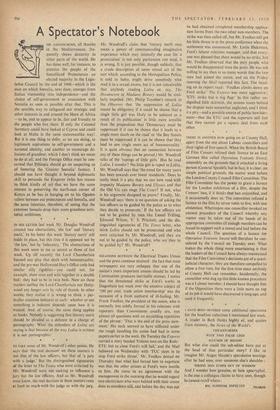TO TAKE SOME Of Mr. Woodruff's other points. He says
that 'the real decision' on these matters is not that of the law officers, but that of 'a jury with a judge.' But the distinguished signatories of the letter to The Tittles who were criticised by Mr. Woodruff were not seeking to influence a jury but the law officers. And as Mr. Woodruff must know, the real decision in these matters rests at least as much .with the judge as with the jury. Mr. Woodruff's claim that 'literary merit may mean a power of communicating imaginative experience which may intensify the case for a prosecution' is not only puritanism run mad, it is wrong. It is just possible, though unlikely, that a crude description of some sexual act of the sort which, according to the Metropolitan Police, is sold in Soho, might drive somebody who read it to a sexual excess, but it is not conceivable that anybody reading Lolita or, say, The Decameron or Madame Bovary would be simi- larly impelled. (Mr. Philip Toynbee's remark in the Observer that 'the suppression of Lolita would be obligatory if it could be shown that a single little girl was likely to be seduced as a result of its publication' is little more sensible than the proposition that 'Democracy must be suppressed if it can be shown that it leads to a single more death on the road' or `the Boy Scputs must be suppressed if it can be shown that they lead to one single more act of homosexuality.' It is quite obvious that no connection between any of these things can be proved.) Mr. Woodruff talks of the `rapings of little girls.' Has he read Lolita, I wonder? No little girl is raped in Lolita. Mr. Woodruff says that `the trend for many years has been towards ever lower standards.' Does he really think it a pity that we can now read with impunity Madame Bovary and Ulysses and that the Old Vic can stage The Cenci? If not, what is his argument designed to prove? Finally, Mr. Woodruff says `there is no question of asking the law officers to be guided by the police as to what they decide to prosecute.' If the law officers are not to be guided by men like Lionel Trilling, Edmund Wilson, V. S. Pritchett, and the dis- tinguished signatories of The Times letter, who think Lolita should not be prosecuted and who were criticised -by Mr. Woodruff, and they are not to be guided by the police, who are they to be guided by? Mr. Woodruff?






































 Previous page
Previous page